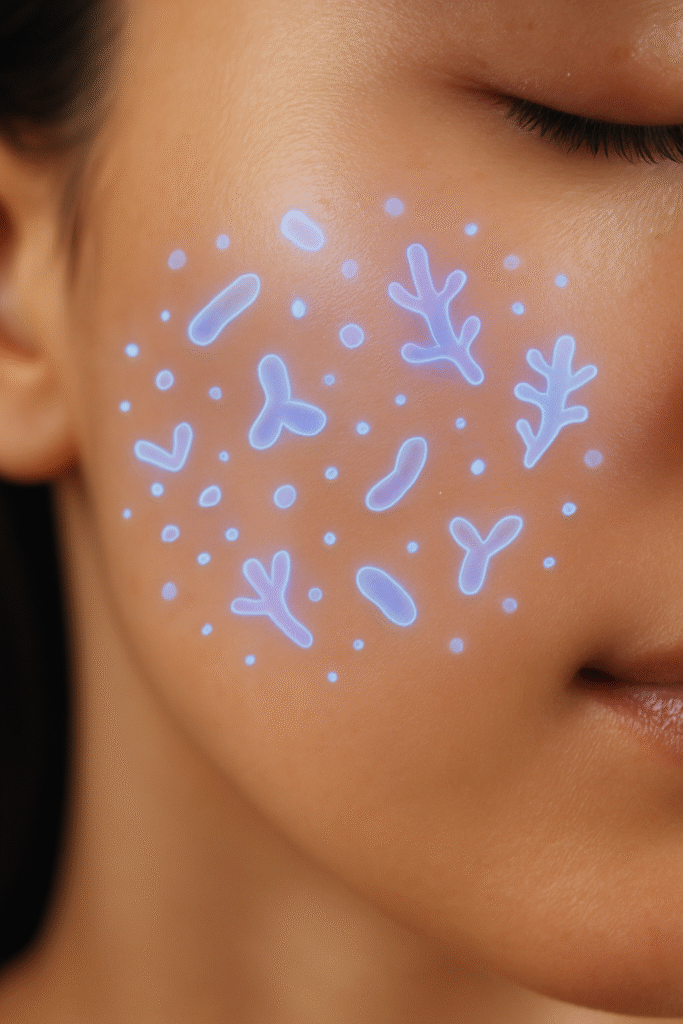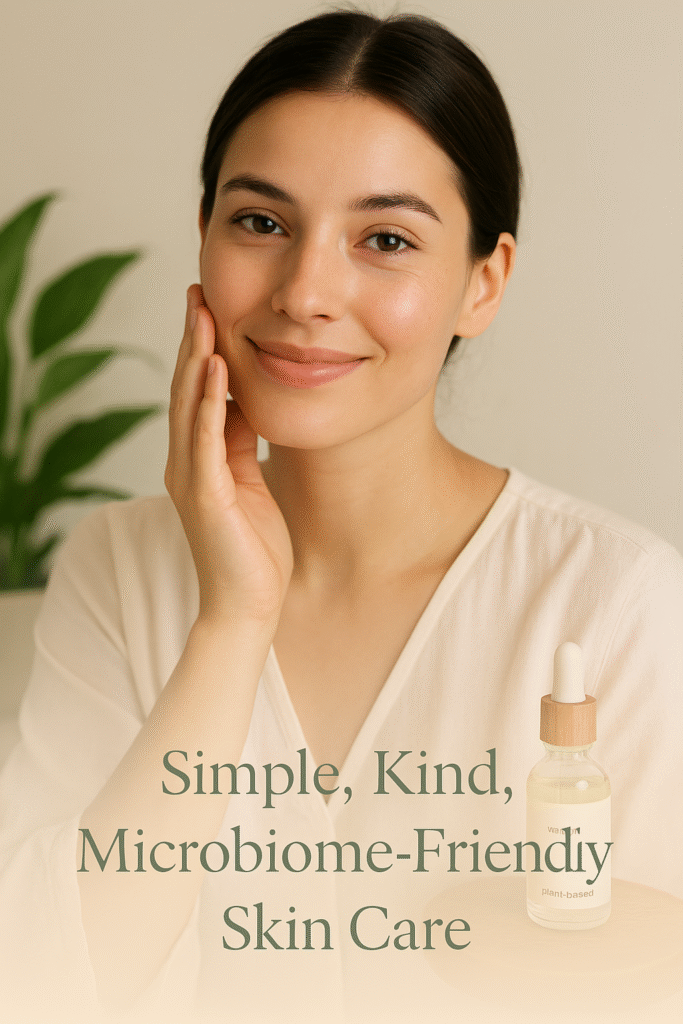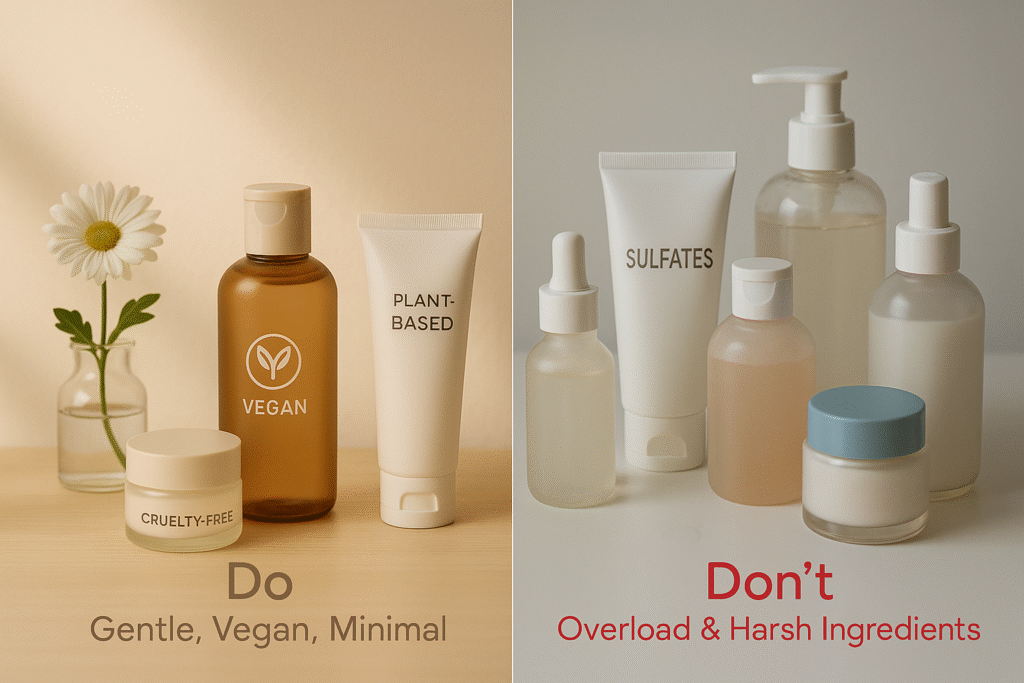Your skin has its own little ecosystem – and it’s more important than you think.
This invisible layer, called your skin microbiome, is made up of tiny organisms that help keep your skin clean, calm and resilient. But when it’s damaged by harsh products, over-cleansing or everyday stress, your skin can start to feel dry, irritated or unbalanced.
That’s where microbiome skin care comes in. It’s a gentle, natural way to support your skin barrier and help it protect itself, without the need for complicated routines or harsh ingredients. In this post, you’ll find simple tips to help you get started naturally and at your own pace.

Table of Contents
- 1 What Is Microbiome Skin Care?
- 2 Why Your Skin Barrier Matters
- 3 Key Principles of Microbiome-Friendly Skin Care
- 4 Microbiome Skin Care Routine (Simple and Natural)
- 5 The Best Natural Ingredients for a Healthy Skin Microbiome
- 6 Common Mistakes That Can Harm Your Skin Microbiome
- 7 Simple Lifestyle Habits That Support Skin Health
- 8 Final Thoughts: Creating a Routine That Feels Right
- 9 Frequently Asked Questions (FAQ)
What Is Microbiome Skin Care?
Your skin microbiome is a mix of tiny organisms – like bacteria, fungi and even viruses – that naturally live on your skin. Although it might sound a little strange, they’re actually helpful! A healthy microbiome works like a protective team: It keeps harmful bacteria out, helps soothe irritation, and supports your skin’s natural barrier.
Microbiome skin care is all about treating this invisible ecosystem carefully. That means using gentle products that won’t harm your skin, avoiding harsh chemicals, and choosing ingredients that work with your skin, not against it.
When your microbiome is happy, your skin is more likely to be soft, look healthy, and respond better to your routine. However, when it becomes imbalanced, you may notice dryness, redness, or acne.
The good news? Microbiome skin care isn’t complicated, and it can fit beautifully into a simple, natural routine.
Why Your Skin Barrier Matters
Your skin barrier is like a natural shield. This is the outermost layer of your skin, and it plays a big role in keeping moisture in and irritants out. When it’s healthy, your skin feels calm, soft, and smooth. But when it’s damaged, you may notice dryness, sensitivity, or acne that won’t go away.
Your microbiome and skin barrier are closely connected. Think of them as a team; when one is imbalanced, the other can struggle, too. That’s why it’s vital to care for both.
Key Principles of Microbiome-Friendly Skin Care
When it comes to protecting your skin’s microbiome, less is usually more. You don’t need many fancy items. In fact, keeping things simple can actually be better for your skin.
Here are some gentle, beginner-friendly tips that can help you care for your skin in a more thoughtful, natural way:
- Be gentle with cleansing: Harsh soaps or over-washing can strip your skin and upset your microbiome. Try using a gentle, fragrance-free cleanser that is just enough to clean, not to dry out.
- Avoid too many active ingredients: Strong acids or harsh exfoliants may seem like a quick fix, but they can weaken your skin barrier if overused. They’re fine to use in moderation, but your skin also needs time to rest and recover.
- Use pH-balanced products: The pH of healthy skin is somewhat acidic, which is ideal for your microbiome skin care. pH-balanced products (often labelled at 5.5) can assist in maintaining that balance.

- Look for prebiotics and probiotics: Some natural skincare products now contain ingredients that support the skin’s microbiome, such as fermented extracts, probiotics or prebiotics. These help create a good environment for your skin’s helpful microorganisms.
- Keep your routine consistent: Going from one product to the next can confuse your skin. Give your routine time – sometimes, your skin just needs consistency to feel better.
Microbiome Skin Care Routine (Simple and Natural)
You don’t need a shelf full of products to care for your microbiome. In fact, a simple and consistent routine often works best. Below is a basic, everyday routine that supports your skin barrier and microbiome – using gentle, natural steps.
☀️ Morning Routine
- Cleanse (if needed): For oily or acne-prone skin, use a mild, non-stripping cleanser. If not, a simple lukewarm water wash can be sufficient.
- Toner (optional): If you like using a toner, use something alcohol-free and calming, like rose water or oat-based formulas.
- Moisturize: A light, hydrating moisturizer helps keep your skin barrier happy. Look for ingredients like aloe vera, squalane, or ceramides.
- Protect: Use a mineral-based SPF (like zinc oxide) to protect your skin from UV damage without disturbing your microbiome.
🌙 Evening Routine
- Gently cleanse: Use a gentle cleanser to remove the day’s sunscreen, makeup, and pollution.
- Moisturize and repair: Apply a nourishing moisturizer — something simple that hydrates your skin and helps it repair overnight. Some people prefer to use a barrier cream or oil (like jojoba or rosehip).
- Soothe: Avoid exfoliating too often, especially if your skin feels dry or sensitive. Your microbiome needs time to restore naturally.
The Best Natural Ingredients for a Healthy Skin Microbiome
When choosing microbiome skin care products or DIY options, looking for ingredients that are gentle and naturally supportive can go a long way. Certain plant-based and skin-friendly ingredients help keep your microbiome balanced, as well as strengthen your skin barrier.
Here are some ingredients often found in microbiome skin care that can help support your skin:
✨ Aloe vera
Soothing and hydrating, aloe vera is great for calming irritated or sensitive skin. It helps retain moisture and is generally well-tolerated by most skin types.
✨ Oat extract (colloidal oatmeal)
Known for its calming and anti-inflammatory effects, oat extract can help reduce redness and aid barrier repair.
✨ Squalane
A mild oil that mimics your skin’s natural moisture level. It absorbs easily, doesn’t clog pores, and helps lock in hydration. (Plant-derived squalane is usually vegan; check the label if that matters to you.)
✨ Jojoba oil
This plant oil is similar to the skin’s natural sebum and is great for sealing in moisture.
✨ Rosehip oil
Rich in antioxidants and essential fatty acids, rosehip oil may aid skin regeneration and help soothe irritation.
✨ Fermented ingredients (such as Lactobacillus)
Some products use fermented extracts that help create a healthy environment on the skin’s surface, supporting good bacteria. (If you’re choosing vegan products, pick ones that are clearly marked as vegan-friendly.)
Research from the National Institutes of Health explores the diversity of skin microbes and their role in skin health, highlighting the importance of supporting a balanced skin microbiome.
Common Mistakes That Can Harm Your Skin Microbiome

Supporting your skin’s microbiome doesn’t just mean using the right products, it also means avoiding habits that could be harming your skin, and you don’t even realize it.
Here are some common mistakes that can affect your microbiome:
- Over-cleansing or using harsh soaps: Washing your face too often, especially with strong-foaming cleansers or antibacterial soaps, can strip out natural oils.
- Too many active ingredients at once: Using strong ingredients like retinol, AHAs, or BHAs in the same routine or too frequently can weaken your barrier.
- Ignoring product labels: Fragrances, alcohols, and sulphates may make you smell good or feel clean, but they can often be too strong.
- Not applying sunscreen: UV damage can affect your skin’s barrier over time. A gentle, mineral-based sunscreen can help protect your skin.
- Constantly changing products: Trying something new every week can confuse your skin. A consistent, simple routine usually works better in the long run.
Simple Lifestyle Habits That Support Skin Health
Caring for your skin’s microbiome isn’t just about what you put on your skin—it’s also influenced by how you take care of your body overall.
🥦 Eat a balanced, plant-rich diet: Fibre, antioxidants, and healthy fats from whole foods can support your overall skin health. Fermented foods can also help with your gut-skin connection.
😴 Prioritize sleep: Sleep helps your skin recover and rebuild. A lack of it can lead to increased stress and inflammation.
😌 Manage stress gently: Stress affects your skin, too. Even small breaks or calming rituals can help.
🚶♀️ Stay active: Gentle movement helps get blood circulating, which helps nourish your skin.
💧 Stay hydrated: You can maintain a more robust and resilient skin barrier by drinking adequate water.

Final Thoughts: Creating a Routine That Feels Right
Your microbiome is as unique as your skin. There’s no one way that’s right for everyone, but some gentle habits and thoughtful choices can help you create a healthier, more balanced approach to your microbiome skin care.
You don’t require a long list of products or complicated steps. In fact, sometimes less is more. Focusing on simple, natural ingredients and being kind to your skin barrier can make a real difference over time.
This post shares personal insights based on experience, not professional advice. If any part of it resonates with you, let it be a gentle reminder to care for your skin with patience, confidence, and kindness.
Frequently Asked Questions (FAQ)
What is microbiome skin care?
Microbiome skin care means taking care of the tiny organisms that live naturally on your skin – like good bacteria. These microorganisms contribute to skin protection, balance, and soothing. The goal is to support them with gentle, non-stripping products rather than harsh treatments.
How do I know if my skin microbiome is imbalanced?
If your skin is irritated, dry, overly oily or has frequent acne breakouts (even if you’re using products), it could be a sign that your microbiome is out of balance. Over-cleansing, using too many harsh ingredients or not using a moisturizer can all throw things out of balance.
What ingredients support a healthy skin microbiome?
Look for calming, plant-based ingredients like:
• aloe vera
• oat extract
• squalane (plant-derived)
• jojoba or rosehip oil
• fermented ingredients like lactobacillus
These help hydrate, soothe and support your skin’s natural barrier — without disrupting your microbiome.
Can probiotics and prebiotics help your skin?
Yes! Some skincare products contain probiotics (live good bacteria) or prebiotics (ingredients that feed those good bacteria). They can help create a healthy environment on your skin. Just make sure to buy items that are clearly labeled and vegan, if that is essential to you.
Are microbiome skin care products vegan?
Many are vegan, but not all. Always check the label. Look for “vegan-friendly” or “100% vegan” to ensure the ingredients (like probiotics or squalane) are plant-based and not derived from animals.
What's a good microbiome-friendly skincare routine?
Keep it simple:
• Gently cleanse (no harsh scrubs)
• Moisturize with calming, vegan products
• Protect with a mineral-based SPF
Do the same thing at night, focusing on hydration and repair. Less is often more when caring for your microbiome.
